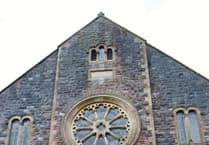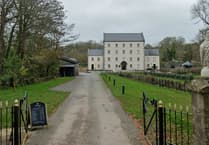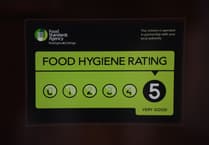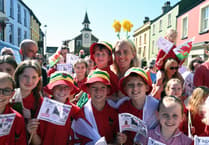Since returning home at the weekend, a well-known solicitor has been speaking about the horrific events he and his family experienced after being caught up in one of the worst natural disasters in living in memory. As reported on the front page, Paul Cowper, his wife Jane and her daughter Joanne Brindley and her partner Will Hammond, from Llanmill, Narberth, were on holiday in Sri Lanka when the disaster struck. The family and two friends from Devon had a miraculous escape from the tragedy which has claimed the lives of tens of thousands of people and left millions homeless after wiping out towns and villages. The group were staying in Tangalle, one of the last major tourist areas on the south coast at a colonial-type two-storey house set in approximately an acre of ground 40 yards from the Indian Ocean. The property, one of only two left standing along threequarters-of-a-mile of coastline, was owned by an Englishman and looked after by a Sri Lankan called Sarath, who lived with his wife and young son in a bungalow in the grounds. After arriving on December 22, the group enjoyed a barbecue on the beach on Christmas Day, but their festive celebrations and their idyllic holiday soon turned to horror when the tsunami stuck. "I got up shortly after 9 on Boxing Day morning and opened the doors of our verandah," explained Paul, who along with Jane and their two friends had visited the area two years previously. He continued: "The sky was blue and it looked to be a perfect day. I noticed some water at the bottom of the garden, which I thought was odd, and I remember thinking surely the tide did not come that far up. We were also aware that the surf was really loud. "I went downstairs and could see Sarath moving the garden furniture, but then he started to shout 'run' and there was a huge wave behind him. The next thing there was pandemonium. We took shelter in the stairwell, but the water was rising fast and coming in around us, so we made it upstairs and all six of us dived onto the rear balcony. "The water just surged through the house carrying with it everything in its wake. It uprooted trees and demolished concrete buildings in seconds. We really thought that the house would not survive, but fortunately it was sturdily built. "When the water subsided, there were further surges, but not as much as the first. The tide went out an extra long way and we could see reefs and rocks not there previously. It was surreal. It was flat calm afterwards, the sky was blue and there was no wind." The group then took in survivors who had been less fortunate than themselves, including an injured 12-year-old French boy who had lost his mother and brother and a German couple who was traumatised after losing his three-year-old child. "Sarath also lost his son, he had hold of him, but he was swept away," added Paul. "Eventually, we plucked up enough confidence to go back downstairs, but we kept an eye on the sea. It was a devasting scene. The house was stripped bare; all that was left of the downstairs was two toothbrushes in a holder in the bathroom. Joanne and Will had been staying downstairs and they lost absolutely everything. "We then discovered that the house had become an island. The sea had breached a river behind the house and the water was just a surging torrent. "I managed to ring my brother in Bristol because we were desperate to know what had hit us; we guessed it was an earthquake, and wanted to know if there was more coming." The group then faced the agony of how they were going to get to safety. "It was a terrifying prospect," said Paul. Fortunately, though, Sarath and about a dozen Sri Lankans came to their aid and led them to safety across the lagoon and marshlands and up to a road. There they were met by the police and the injured were taken to hospital. Paul and his group, meanwhile, made their way into the town where they first took shelter at a temple, before making their way to a hotel which was on higher ground on the otherside of the town. "The town was just totally devastated, but because the hotel was on higher ground it was untouched," said Paul. "That was the bizarre thing - everything on higher ground was totally unaffected. After three days, a bus was laid on by the British High Commission, and they were taken to Colombo where they were processed at an emergency processing centre, before bringing their flight forward and flying home on New Year's Eve.




